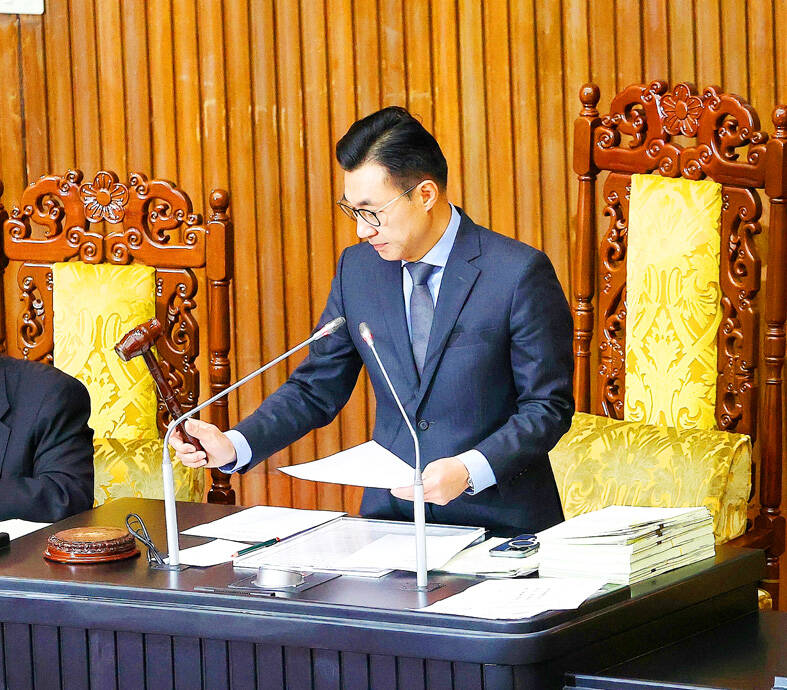Legislators across party lines yesterday passed a measure extending a reduced transaction tax on stock trades for day traders to 2027, which a trade association said would help maintain a high level of market activity.
The amendment to the Securities Transaction Tax Act (證券交易稅條例) would maintain a preferential 0.15 percent transaction tax rate for investors who buy and sell the same stocks in the same session.
The lower rate, which has been in place since April 2017, but was set to expire yesterday, is half the normal transaction tax rate of 0.3 percent, and was originally adopted to drum up trading volume on Taiwan’s stock markets.

Photo: CNA
Chinese Nationalist Party (KMT) Legislator Lai Shyh-bao (賴士葆), who introduced a proposed amendment to the act, said the lower tax on day trading was worth extending, as it has had a positive effect on stock market activity and tax revenue.
Minister of Finance Chuang Tsui-yun (莊翠雲) on Monday urged lawmakers to vote for another extension, saying that failure to do so would risk complicating revenue collection and harming market sentiment.
Financial Supervisory Commission Deputy Chairman Chen Yen-liang (陳彥良) said on Dec. 23 that without the three-year extension, stock trading volume could shrink 30 percent.
The amendment still needs to be signed by the president and promulgated before it takes effect.
Following passage of the amendment, the Taiwan Securities Association said the transaction rate tax cut would continue to benefit market activity, as day trading accounts for about one-fifth of trading volumes and about 40 percent of total market turnover in Taiwan.
The tax cut has been credited with helping to boost turnover in the country’s US$2.5 trillion stock market, the world’s 10th-largest by value.
The benchmark TAIEX closed 0.67 percent lower yesterday, paring an earlier decline of as much as 0.9 percent. The gauge gained 28.47 percent this year, the biggest annual return since 2009, Taiwan Stock Exchange data showed.
Additional reporting by Bloomberg

Sweeping policy changes under US Secretary of Health and Human Services Robert F. Kennedy Jr are having a chilling effect on vaccine makers as anti-vaccine rhetoric has turned into concrete changes in inoculation schedules and recommendations, investors and executives said. The administration of US President Donald Trump has in the past year upended vaccine recommendations, with the country last month ending its longstanding guidance that all children receive inoculations against flu, hepatitis A and other diseases. The unprecedented changes have led to diminished vaccine usage, hurt the investment case for some biotechs, and created a drag that would likely dent revenues and

Global semiconductor stocks advanced yesterday, as comments by Nvidia Corp chief executive officer Jensen Huang (黃仁勳) at Davos, Switzerland, helped reinforce investor enthusiasm for artificial intelligence (AI). Samsung Electronics Co gained as much as 5 percent to an all-time high, helping drive South Korea’s benchmark KOSPI above 5,000 for the first time. That came after the Philadelphia Semiconductor Index rose more than 3 percent to a fresh record on Wednesday, with a boost from Nvidia. The gains came amid broad risk-on trade after US President Donald Trump withdrew his threat of tariffs on some European nations over backing for Greenland. Huang further

CULPRITS: Factors that affected the slip included falling global crude oil prices, wait-and-see consumer attitudes due to US tariffs and a different Lunar New Year holiday schedule Taiwan’s retail sales ended a nine-year growth streak last year, slipping 0.2 percent from a year earlier as uncertainty over US tariff policies affected demand for durable goods, data released on Friday by the Ministry of Economic Affairs showed. Last year’s retail sales totaled NT$4.84 trillion (US$153.27 billion), down about NT$9.5 billion, or 0.2 percent, from 2024. Despite the decline, the figure was still the second-highest annual sales total on record. Ministry statistics department deputy head Chen Yu-fang (陳玉芳) said sales of cars, motorcycles and related products, which accounted for 17.4 percent of total retail rales last year, fell NT$68.1 billion, or

HSBC Bank Taiwan Ltd (匯豐台灣商銀) and the Taiwan High Prosecutors Office recently signed a memorandum of understanding (MOU) to enhance cooperation on the suspicious transaction analysis mechanism. This landmark agreement makes HSBC the first foreign bank in Taiwan to establish such a partnership with the High Prosecutors Office, underscoring its commitment to active anti-fraud initiatives, financial inclusion, and the “Treating Customers Fairly” principle. Through this deep public-private collaboration, both parties aim to co-create a secure financial ecosystem via early warning detection and precise fraud prevention technologies. At the signing ceremony, HSBC Taiwan CEO and head of banking Adam Chen (陳志堅)